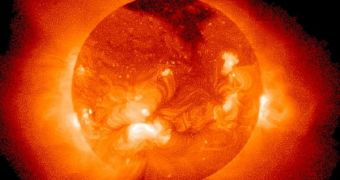The 4.6-billion-year history of our solar system is nowhere crystal clear, astronomers admit. Instead, it's filled with questions as to the origin of some of its most remarkable feats. Here is a top 6 of these mysteries, as compiled by New Scientist.
When the solar system was first formed, immediately after the planets followed. But how come they are so different from each other? And that question goes especially to the outer planets, those beyond Mars. While it’s clear that Venus and Earth were formed in the inner bell, with Mercury and Mars resulting as a by-product, what determined the outside planets to remain only gas giants, or little frosty rocks like Pluto? There's no question that all began to form roughly at the same time.
A striking coincidence that has had astronomers thinking since the old ages is why the Sun and the Moon appear to be the same size during an eclipse. It's known that the Sun is 400 times wider than the Moon, but, then again, the Moon is 400 times further away from the Sun. This creates the optical illusion that the two are actually the same size. Many people ask if this is a mere coincidence. And we have to admit that it would be a big one if there's nothing more to this than chance.
Another thing that concerns astronomers is the existence of Planet X, a hypothetical celestial body that supposedly circles our Sun on an orbit somewhere behind Pluto. Experts say that the distance it revolves around the Sun can only imply that the planet is frozen, but say that it could be as big as Mars, or even Earth. However, direct or even indirect observations of this body are impossible to date.
One of the bigger mysteries concerns the origins of comets. There are multiple theories as to where they came from, but a growing feeling in the international astronomical community is that none of them can accurately explain their origin, despite the fact that they had humans on their toes several times in history, and that they are most probably responsible for the creation of the Moon.
Theologists have used the fact that our solar system is unique as an argument that God created the world. However, their theory was put to the test in 1992, when the first exoplanet was found. Since then, nearly 300 have been identified, but they all reside in solar systems that look quite differently from our own. The question is if the conditions that led to the development of life on Earth can be duplicated in some other system, where telescopes are unable to reach at this point.
The latest mystery concerns the future fate of our solar system. Since its inception, it has led a relatively calm and peaceful existence, developing its planets and consolidating the Sun, but some fear that a cataclysm is on its way, although no one can say for sure if, when, and where it will hit. And we're talking here about collisions between planets, or planets falling into the star in the middle, not merely comet impacts and other such things.

 14 DAY TRIAL //
14 DAY TRIAL //